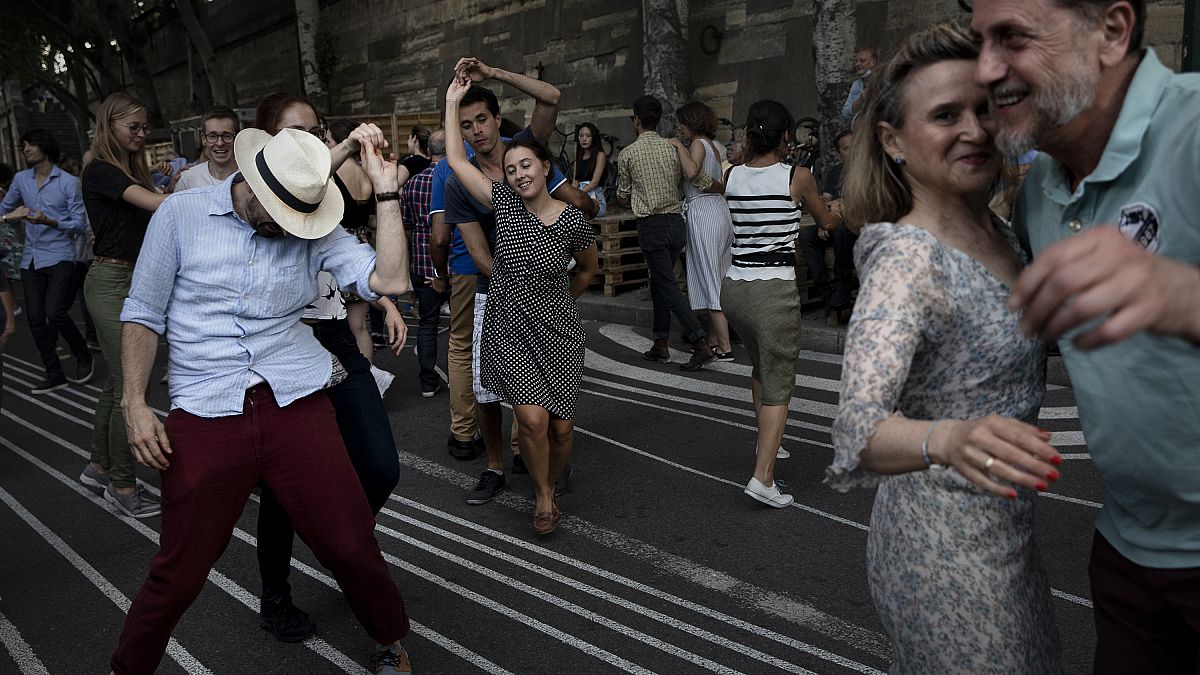In a short space of time, governments have lifted most restrictions meant to contain the deadly virus.
It's official: COVID-19 is over. Or is it?
After two dramatic years plagued with shock, anxiety, chaos, outrage, fatigue and, for the most part, simple boredom, Europeans appear to have decided to collectively move on from the lethal pandemic that upended every single aspect of their daily lives, triggered a once-in-a-lifetime economic crisis and forever transformed professional and personal habits.
The continent has had enough of travel restrictions, city curfews, business closures and QR-powered passports. The mask is off and the music is in: the Venice Carnival, the Glastonbury Festival and the Munich Oktoberfest are all back, anxious to make up for the time lost in hibernation.
The sudden shift was a long time coming: ever since the first wave of coronavirus infections began to wane in mid-2020, Europeans have been impatiently waiting for the perfect chance to turn the page and erase all nasal swabs from memory.
But the sought-after transition was repeatedly hijacked by the emergence of new and increasingly contagious virus variants and the subsequent re-establishment of lockdown measures, an on-and-off dynamic that soon produced a widespread and dizzying feeling of déjà vu.
When news arrived that the highly infectious Omicron variant was in fact causing relatively mild and manageable symptoms, many saw the end nearer than ever.
Emboldened by a successful vaccination roll-out, European countries started to gradually lift rules, curbs and regulations until they became marginal and, in some cases, symbolic.
Spain, one of the hardest-hit nations by the pandemic, revoked its two-year-long decree that imposed mandatory mask-wearing in outdoors and indoor spaces, relegating the practice to just public transport and healthcare premises.
Austria repealed its so-called 3G rules (vaccinated, recovered or tested) to enter restaurants, bars and clubs while France completely abolished its green pass, a pioneering initiative that inspired other countries to follow suit but fuelled weeks of popular discontent.
Germany, Belgium, the Netherlands, Sweden, Poland, Romania, Hungary, Ireland and the United Kingdom also moved to pull the plug on all or most restrictions.
Denmark took things a step further when it became the first European country to halt its COVID-19 vaccination programme, arguing the inoculation coverage – over 82% of the population are double-jabbed – is enough to contain the pandemic at its present stage.
"We are in a good place. Spring has come and we have good control of the epidemic, which seems to be subsiding," said Bolette Søborg, unit manager at the country's National Board of Health.
The Danish authority plans to resume the programme again in autumn, when infections are expected to rise and new variants might spread.
The cascade of developments led the European Commission to declare the pandemic had entered a new chapter, one in which counting every single case is rendered redundant. Instead of massive testing, the executive recommended, countries should focus on targeted and reliable samples to detect new variants.
"We are entering another phase of the pandemic," said Stella Kyriakides, EU Commissioner for health, in late April. "A new phase that requires us to rethink how we manage the virus."
Kyriakides encouraged the campaign of booster doses to carry on and pointedly noted that over 90 million of EU citizens remain unvaccinated.
"A great deal has been achieved, but preparedness and structural resilience are key," she added.
Notably, the Commissioner said that between 60 and 80% of the bloc's population are estimated to have been infected by the virus at one point over the past two years.
The limits of human resilience
The sheer numbers raise the question on how much tolerance Europeans have left to cope with a disease that has achieved such degree of omnipresence in their daily lives.
Governments have become acutely aware of the narrowing will of citizens to sustain the burden of restrictions, a realisation made evident by how quickly countries moved to lift the exceptional measures as soon as the Omicron wave peaked in January.
Media too appear to be in a rush to leave the virus behind and switch up the conversation.
The pandemic has been pushed out of the front page to make way for Russia's invasion of Ukraine, international sanctions and soaring energy prices. Google Trends shows a steady decrease in interest for the term "COVID-19" across the largest European countries.
But this joint effort to make a fresh start hides two uncomfortable truths.
First, the pandemic is not over. Europeans continue to succumb to the disease on a daily basis, even if hospitals are no longer overwhelmed (more than 13,000 deaths were registered in April).
In Asia, Omicron is wreaking havoc, with China imposing a draconian zero-COVID strategy that is igniting public anger and disrupting global supply chains. And around the world, vaccine inequality remains alarmingly high: only 15% of people in low-income countries have received the first dose.
"Although reported cases and deaths are declining globally, and several countries have lifted restrictions, the pandemic is far from over – and it will not be over anywhere until it’s over everywhere," said Dr Tedros Adhanom Gebreyesus, director of the World Health Organization (WHO), in early March while marking two years since the international body defined COVID-19 as a pandemic.
The second truth masked underneath this sudden transition is the fact that some people are neither willing nor ready to move on from the virus, at least not so fast. In some instances, the trauma of living two years in a state of constant alarm can prove paralysing, despite the overall outlook giving cause for optimism.
"The general impression is that people are moving on really quickly and behaving as if COVID didn't exist anymore. I think, however, that this kind of broad vision is not common to everybody," Carmine Pariante, professor of biological psychiatry at King's College London, told Euronews.
"The level of anxiety in the population about COVID is still very high. There are a lot of people who are still struggling with socialising in groups, going to restaurants, going to crowded places. And even if they're doing it, they feel a lot of anxiety about it. So the normalisation will be progressive."
Mental health has been one of the main casualties of the virus. In the first year of the pandemic, global prevalence of anxiety and depression increased by a stunning 25% rate, according to a scientific brief released in March by the WHO.
The organisation cites the "unprecedented stress caused by social isolation" as the driver behind the worrying trend, coupled with loneliness, fear of infection, grief after bereavement, financial problems and, in the case of essential workers, physical exhaustion.
These mental health scars will be long-term and far-reaching, experts warn, and will persist within our societies as infections continue to drop. It will be up to governments to decide how much prominence – and, most importantly, investment – they give to the virus and its ripple effects in the coming years.
These political decisions will in turn determine how fast the collective consciousness moves on from the deadly disease and enters the post-COVID era, Pariante said.
"If [national] leaders drop COVID-19 completely from the agenda, then, I think, we will forget it too," the professor noted.
"But there will be lots of vulnerable people who will be affected by the consequences of the pandemic for a long time, even if society overall may bounce back."

